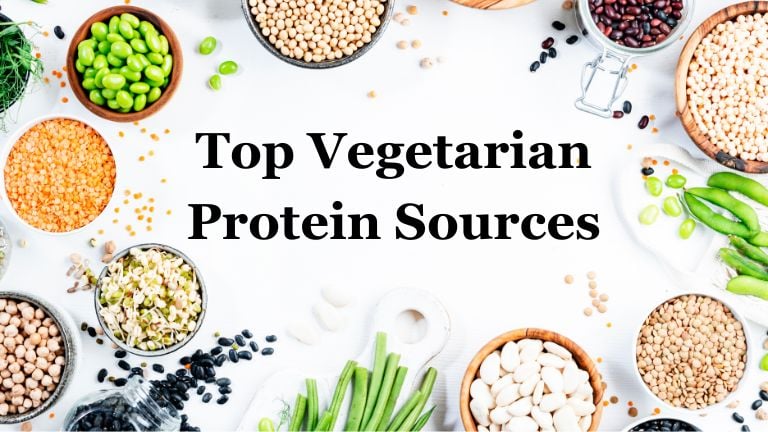🌱 Vegetarian Protein Sources Calculator
Discover 500+ plant-based & dairy protein sources worldwide. Track complete proteins, PDCAAS scores, and prevent nutrient deficiencies.

Vegetarian Protein Sources Calculator & Guide
Protein is essential for muscle repair, immune function, hormone production, and overall health. Vegetarian diets offer abundant protein sources from complete proteins like soy, quinoa, and dairy to complementary protein combinations like dal-rice and beans-grains.
This calculator provides comprehensive protein data for 500+ vegetarian foods worldwide, including plant-based proteins, dairy, eggs, nuts, seeds, legumes, and meat alternatives. Understanding protein quality (PDCAAS scores), complete vs. incomplete proteins, and nutrient pairing helps vegetarians optimize muscle building, weight management, and prevent common deficiencies (Iron, B12, Calcium, Zinc). For restaurant nutrition, check out Restaurant Calories.High-Protein Vegetarian Foods Chart
| Protein Source | Protein (100g) | Calories | Protein Type | Complete Protein |
|---|---|---|---|---|
| Seitan (Wheat Gluten) | 75.2g | 370 | Meat Alternative | ❌ No |
| Spirulina (Dried) | 57g | 290 | Algae/Other | ✅ Yes |
| Soya Chunks (Dry) | 52g | 345 | Soy Product | ✅ Yes |
| Nutritional Yeast (Fortified) | 50g | 325 | Other | ✅ Yes |
| Hemp Seeds | 31.6g | 553 | Nuts & Seeds | ✅ Yes |
| Pumpkin Seeds | 30.2g | 559 | Nuts & Seeds | ❌ No |
| Peanuts | 25.8g | 567 | Nuts & Seeds | ❌ No |
| Cheese (Cheddar) | 25g | 402 | Dairy & Eggs | ✅ Yes |
| Almonds | 21.2g | 579 | Nuts & Seeds | ❌ No |
| Sunflower Seeds | 20.8g | 584 | Nuts & Seeds | ❌ No |
| Tempeh | 20.3g | 193 | Soy Product | ✅ Yes |
| Paneer | 18.3g | 265 | Dairy & Eggs | ✅ Yes |
| Flax Seeds | 18.3g | 534 | Nuts & Seeds | ❌ No |
| Tofu (Firm) | 17.3g | 144 | Soy Product | ✅ Yes |
| Chia Seeds | 16.5g | 486 | Nuts & Seeds | ❌ No |
| Soya Chunks (Cooked) | 16g | 110 | Soy Product | ✅ Yes |
| Eggs (Boiled) | 12.6g | 155 | Dairy & Eggs | ✅ Yes |
| Cottage Cheese | 12.4g | 72 | Dairy & Eggs | ✅ Yes |
| Edamame | 11.9g | 122 | Soy Product | ✅ Yes |
| Greek Yogurt | 10.2g | 97 | Dairy & Eggs | ✅ Yes |
| Masoor Dal (Lentils) | 9g | 114 | Legumes & Beans | ❌ No |
| Chickpeas (Chana) | 8.9g | 164 | Legumes & Beans | ❌ No |
| Black Beans | 8.9g | 132 | Legumes & Beans | ❌ No |
| Kidney Beans (Rajma) | 8.7g | 127 | Legumes & Beans | ❌ No |
Complete Vegetarian Protein Database
🌱 Complete vs Incomplete Proteins
| Protein Source | Protein (100g) | PDCAAS Score | Complete Protein? | Limiting Amino Acid |
|---|---|---|---|---|
| Soy Protein (Tofu, Tempeh) | 15-20g | 1.0 | ✅ Yes | None |
| Quinoa | 4.4g | 1.0 | ✅ Yes | None |
| Eggs | 12.6g | 1.0 | ✅ Yes | None |
| Dairy (Milk, Paneer) | 3-18g | 1.0 | ✅ Yes | None |
| Amaranth | 3.8g | 0.9 | ✅ Yes | None |
| Hemp Seeds | 31.6g | 0.63 | ✅ Yes | None |
| Spirulina | 57g | 0.74 | ✅ Yes | None |
| Lentils (Dal) | 9g | 0.70 | ❌ No | Methionine |
| Chickpeas | 8.9g | 0.78 | ❌ No | Methionine |
| Black Beans | 8.9g | 0.75 | ❌ No | Methionine |
| Peanuts | 25.8g | 0.52 | ❌ No | Methionine |
| Almonds | 21.2g | 0.52 | ❌ No | Lysine |
| Rice (Brown) | 2.6g | 0.47 | ❌ No | Lysine |
| Wheat (Seitan) | 75g | 0.25 | ❌ No | Lysine |
🥛 Dairy & Egg Protein Sources
| Dairy/Egg Product | Protein (100g) | Calories | Calcium (mg) | B12 (µg) |
|---|---|---|---|---|
| Cheese (Cheddar) | 25g | 402 | 721 | 1.1 |
| Paneer (Cottage Cheese) | 18.3g | 265 | 208 | 0.3 |
| Cottage Cheese (Low-Fat) | 12.4g | 72 | 91 | 0.6 |
| Eggs (Boiled) | 12.6g | 155 | 50 | 1.1 |
| Greek Yogurt | 10.2g | 97 | 115 | 0.5 |
| Regular Yogurt (Dahi) | 3.5g | 61 | 121 | 0.4 |
| Skim Milk | 3.4g | 35 | 113 | 0.4 |
| Whole Milk | 3.3g | 64 | 113 | 0.4 |
🌱 Soy & Legume Protein Foods
| Plant Protein | Protein (100g) | Calories | Fiber (g) | Iron (mg) |
|---|---|---|---|---|
| Soya Chunks (Dry) | 52g | 345 | 13 | 20 |
| Tempeh | 20.3g | 193 | 9 | 2.7 |
| Tofu (Firm) | 17.3g | 144 | 2.3 | 2.7 |
| Soya Chunks (Cooked) | 16g | 110 | 4 | 6 |
| Edamame | 11.9g | 122 | 5.2 | 2.3 |
| Masoor Dal (Lentils) | 9g | 114 | 7.9 | 3.3 |
| Chickpeas (Chana) | 8.9g | 164 | 7.6 | 2.9 |
| Black Beans | 8.9g | 132 | 8.7 | 2.1 |
| Kidney Beans (Rajma) | 8.7g | 127 | 6.4 | 2.9 |
| Pinto Beans | 9g | 143 | 9 | 2.1 |
| Urad Dal (Black Gram) | 7.5g | 105 | 4.9 | 2.57 |
| Toor Dal (Pigeon Peas) | 7.05g | 117 | 5.1 | 1.17 |
| Sprouted Moong | 7.5g | 104 | 2.8 | 1.4 |
🥘 Popular Vegetarian Protein Dishes
| Dish | Serving Size | Protein (g) | Calories | Cuisine |
|---|---|---|---|---|
| Palak Paneer | 1 bowl (200g) | 8.5 | 165 | North Indian |
| Paneer Tikka | 6 pieces (150g) | 15.2 | 280 | North Indian |
| Chole (Chickpea Curry) | 1 bowl (150g) | 7.2 | 158 | North Indian |
| Dal Makhani | 1 bowl (200g) | 7.8 | 165 | North Indian |
| Rajma (Kidney Beans) | 1 bowl (200g) | 9.4 | 180 | North Indian |
| Sambar (Lentil Stew) | 1 bowl (200g) | 3.8 | 72 | South Indian |
| Idli (4 pieces) | 200g | 5.6 | 156 | South Indian |
| Tofu Stir-Fry | 1 plate (250g) | 14.5 | 225 | Asian |
| Veggie Burger (Beyond) | 1 burger (113g) | 20g | 250 | Western |
| Hummus & Falafel Plate | 1 plate (200g) | 12g | 330 | Mediterranean |
🥜 Nuts & Seeds Protein
| Nut/Seed | Protein (100g) | Calories | Healthy Fats (g) | Usage |
|---|---|---|---|---|
| Pumpkin Seeds | 30.2g | 559 | 49 | Snacking |
| Peanuts | 25.8g | 567 | 49.2 | Snacking/Roasted |
| Almonds | 21.2g | 579 | 49.9 | Snacking/Raw |
| Pistachios | 20.2g | 562 | 45.3 | Snacking |
| Cashews | 18.2g | 553 | 43.8 | Snacking |
| Walnuts | 15.2g | 654 | 65.2 | Snacking |
| Chia Seeds | 16.5g | 486 | 30.7 | Supplements |
| Flax Seeds | 18.3g | 534 | 42.2 | Supplements |
🥦 Protein-Rich Vegetables
| Vegetable | Protein (100g) | Calories | Vitamin C (mg) | Region |
|---|---|---|---|---|
| Spinach (Palak) | 2.9g | 23 | 28 | All regions |
| Broccoli | 2.8g | 34 | 89 | Regional |
| Cauliflower | 1.9g | 25 | 48 | All regions |
| Green Peas | 5.4g | 81 | 40 | All regions |
| Corn | 3.4g | 86 | 6.8 | All regions |
| Potatoes | 2g | 77 | 19.7 | All regions |
| Okra (Bhindi) | 1.9g | 33 | 23 | All regions |
| Tomatoes | 0.9g | 18 | 14 | All regions |
🔗 Protein Complementation Guide
| Food Combination | Protein Quality | Example Meals | Total Protein |
|---|---|---|---|
| Legumes + Grains | Complete | Dal + Rice, Beans + Tortilla | 12-15g per cup |
| Legumes + Nuts/Seeds | Complete | Hummus + Tahini, Lentils + Walnuts | 15-18g per cup |
| Grains + Dairy | Complete | Oatmeal + Milk, Bread + Cheese | 10-12g per serving |
| Vegetables + Dairy | Complete | Spinach + Paneer, Broccoli + Cheese | 8-10g per serving |
| Nuts + Seeds | Enhanced | Trail Mix, Nut Butter + Chia | 12-15g per 50g |
| Soy + Any Food | Already Complete | Tofu Scramble, Tempeh Bowl | 15-20g per serving |
⚠️ Vegetarian Nutrient Deficiency Prevention
| Nutrient | Daily Requirement | Best Vegetarian Sources | Absorption Tips |
|---|---|---|---|
| Vitamin B12 | 2.4 µg | Eggs, Dairy, Fortified Nutritional Yeast, Fortified Foods | Supplementation required for vegans |
| Iron | 8-18 mg | Lentils, Spinach, Tofu, Pumpkin Seeds | Pair with Vitamin C for absorption |
| Calcium | 1000-1200 mg | Dairy, Fortified Plant Milk, Tofu, Chia Seeds | Vitamin D enhances absorption |
| Zinc | 8-11 mg | Pumpkin Seeds, Chickpeas, Hemp Seeds, Cashews | Soak legumes to improve bioavailability |
| Omega-3 (ALA) | 1.1-1.6 g | Flax Seeds, Chia Seeds, Walnuts, Hemp Seeds | Grind flax/chia for better absorption |
| Vitamin D | 600-800 IU | Fortified Dairy, Egg Yolks, Sunlight | Consider supplementation in winter |
Daily Protein Requirements by Age & Activity
Sedentary Adults: 0.8g per kg body weight (56g for 70kg person)
Moderately Active: 1.2-1.4g per kg body weight (84-98g for 70kg person)
Athletes/Bodybuilders: 1.6-2.0g per kg body weight (112-140g for 70kg person)
Pregnant Women: 1.1g per kg body weight (77g for 70kg person)
Older Adults (65+): 1.0-1.2g per kg body weight (70-84g for 70kg person)
Distribution: Spread protein intake across meals for optimal absorption. Aim for 20-30g protein per meal
and 10-15g per snack. Include complete protein sources (animal or complementary plant proteins) for optimal muscle
protein synthesis.
Frequently Asked Questions
How do vegetarians get complete proteins?
Vegetarians can get complete proteins (all 9 essential amino acids) from several sources:
Single complete sources: soy products (tofu, tempeh, edamame), quinoa, amaranth, hemp seeds, spirulina, eggs, and dairy (paneer, milk, yogurt) all provide complete protein profiles.
Protein complementation: Combining legumes + grains (dal + rice, beans + tortilla), legumes + nuts/seeds (hummus + tahini), or grains + dairy (oats + milk) creates complete amino acid profiles.
Do I need protein powder as a vegetarian?
Most vegetarians can meet protein needs through whole foods without supplements. Athletes, bodybuilders, or those with high protein requirements (1.6-2.0g per kg body weight) may benefit from protein powder for convenience.
Vegetarian protein powders: Soy protein isolate (PDCAAS 1.0, complete), pea protein (0.89, high in lysine), rice + pea blend (complete when combined), hemp protein (complete, high fiber), egg white protein (1.0, complete for ovo-vegetarians).
Priority: Focus on whole food sources first—tofu, tempeh, lentils, quinoa, dairy, eggs—then add protein powder only if needed to reach daily targets. Track your intake using this calculator to determine if supplementation is necessary.
How much protein do vegetarians need daily?
Vegetarian protein needs are similar to omnivores, though some experts recommend 10% more to account for lower bioavailability of some plant proteins.
RDA: Sedentary adults need 0.8-1.0g per kg body weight (56-70g for 70kg person), moderately active individuals need 1.2-1.4g/kg (84-98g for 70kg), athletes need 1.6-2.0g/kg (112-140g for 70kg), and pregnant/breastfeeding women need 1.1-1.3g/kg (77-91g for 70kg).
Distribution: Spread protein across meals (20-30g per meal) for optimal muscle protein synthesis. Include complete proteins or complementary combinations at most meals. Use our protein calculators to determine your specific requirements.
⚕️ Medical Disclaimer
This Vegetarian Protein Sources Calculator provides nutritional estimates based on USDA FoodData Central and global nutrition databases and should not replace professional medical or dietary advice. Individual protein and micronutrient needs vary based on age, sex, weight, height, activity level, health conditions, and medications. Nutritional values shown are averages and may differ from actual foods based on ingredients, preparation methods, brand variations, and soil quality. Vegetarians, especially vegans, should monitor B12, Iron, Calcium, Zinc, and Omega-3 intake regularly. Consult with registered dietitians, nutritionists, or healthcare professionals before making significant dietary changes, especially if you have kidney disease, liver conditions, anemia, osteoporosis, or other health concerns. Pregnant and breastfeeding vegetarian women should seek professional guidance for appropriate protein and micronutrient planning. This tool is for educational and informational purposes only. For personalized vegetarian nutrition advice, visit Fit Life Regime or consult qualified healthcare professionals.

Manish is a NASM-certified fitness and nutrition coach with over 10 years of experience in weight lifting and fat loss fitness coaching. He specializes in gym-based training and has a lot of knowledge about exercise, lifting technique, biomechanics, and more.
Through “Fit Life Regime,” he generously shares the insights he’s gained over a decade in the field. His goal is to equip others with the knowledge to start their own fitness journey.
